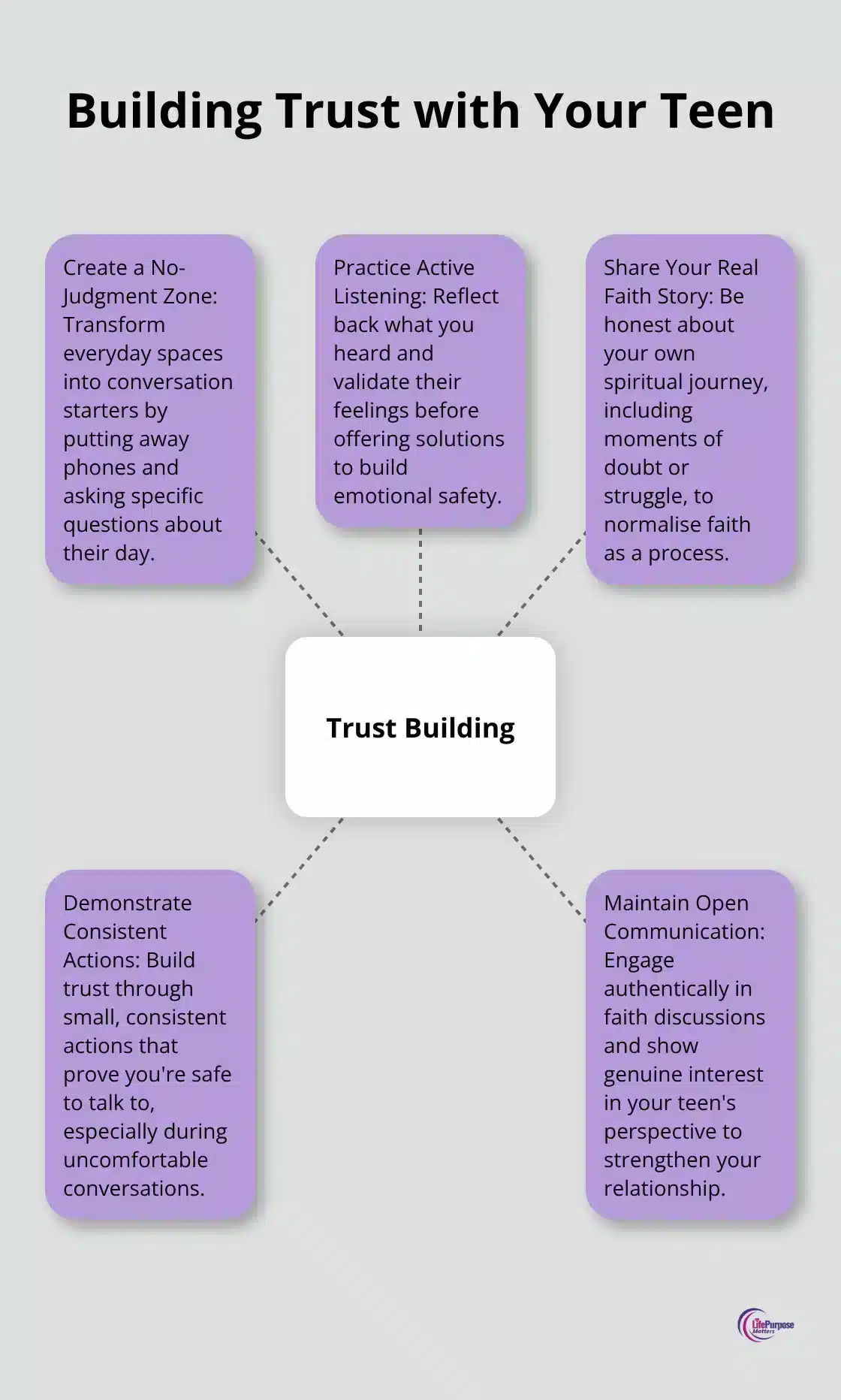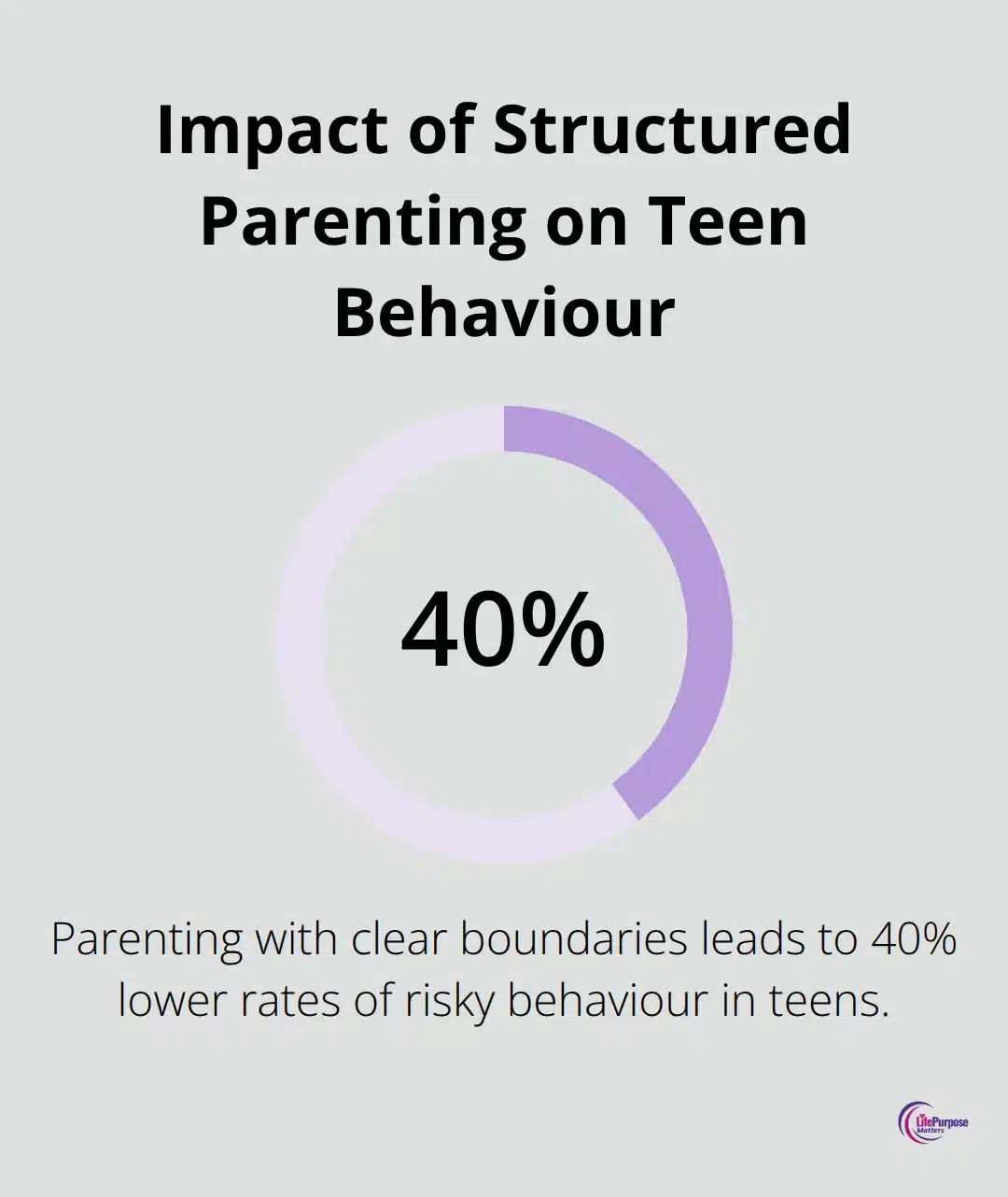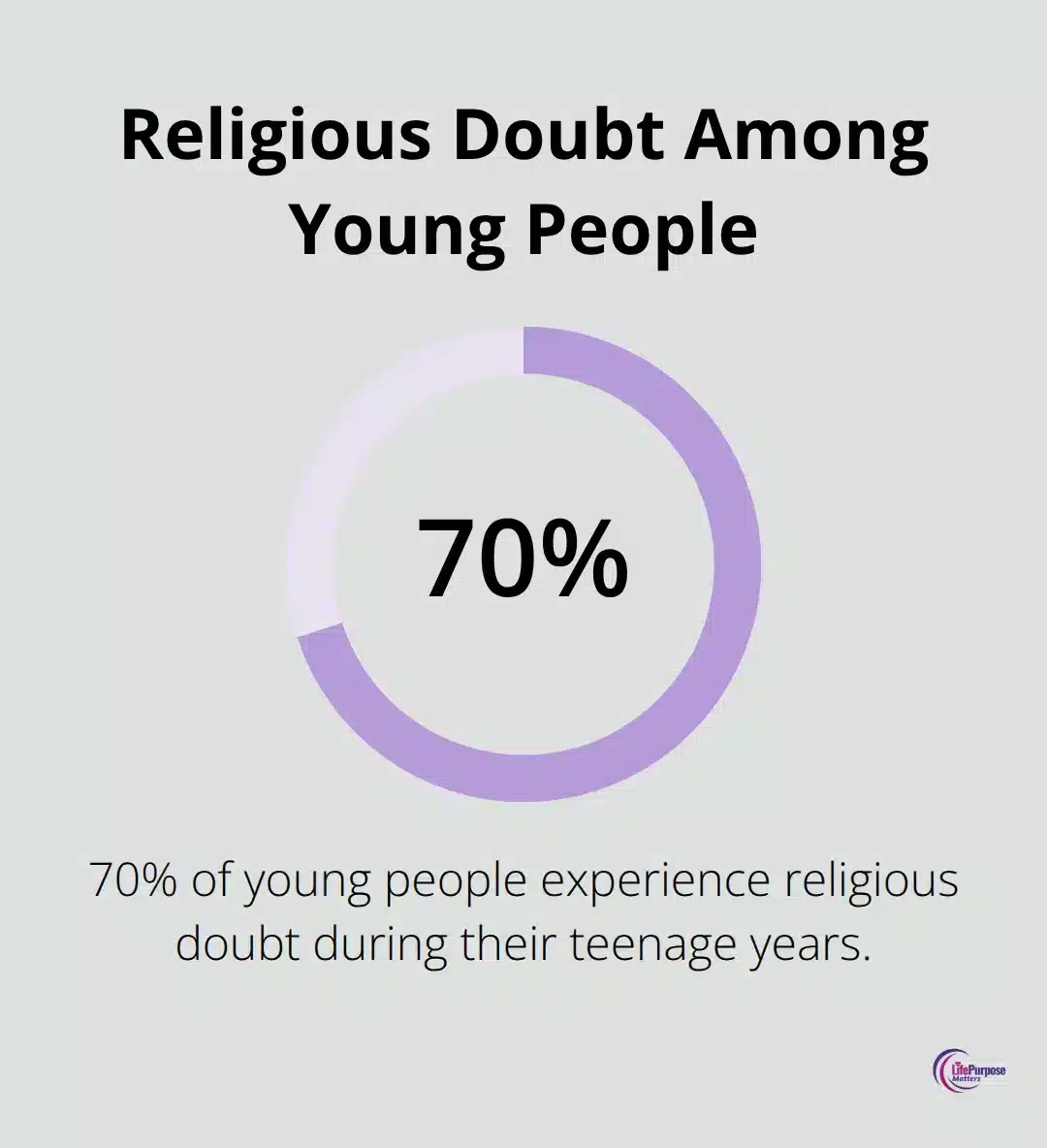Navigating teenage years while remaining faithful to your Christian principles can feel overwhelming at times, can’t it? Those eye rolls, the challenging questions about faith, and the constant push for independence can leave any parent wondering if they’re doing it right. In adolescence, as young people develop their own identity and worldview, Christian parents have a unique opportunity to guide them toward a personal and mature faith, rather than simply an inherited one. Christian parenting is therefore vital during the teenage years because it provides a foundational framework of faith, character, and purpose as teens navigate a complex and influential world.
Table of Contents
ToggleHere at Life Purpose Matters, we know that Christian parenting advice for teenagers isn’t one-size-fits-all. Every family’s journey looks different, but the foundation remains the same.
How Do You Build Real Trust With Your Teen?
Trust with teenagers doesn’t happen through grand gestures or perfect parenting moments. It builds through consistent small actions that prove you’re safe to talk to, especially when conversations get uncomfortable.
Make Your Kitchen Table a No-Judgment Zone
The Barna Group found that Christian teenagers benefit from discipleship interactions with their parents, particularly when parents engage authentically in faith discussions. Transform everyday spaces into conversation starters when you put away phones during dinner and ask specific questions about their day instead of generic ones. When your teen shares something that makes you want to lecture immediately, pause for five seconds and ask a follow-up question instead. This simple technique prevents the conversation from shutting down and shows them you’re genuinely interested in their perspective (not just correcting it).
Listen First, Fix Later
Active listening means you catch yourself before you jump into solution mode. When parents create environments where teenagers feel heard, it strengthens the parent-teen relationship significantly. When your teen comes to you upset about a friend or stressed about school, resist the urge to immediately offer advice. Instead, reflect back what you heard them say and validate their feelings before you suggest solutions. This approach builds emotional safety and teaches them that their thoughts and feelings matter to you.
Share Your Real Faith Story
Your teenager needs to see that faith isn’t about having all the answers perfectly figured out. Share specific moments when you questioned God, felt distant from Him, or struggled with doubt. Tell them about the time you were angry at God during a difficult season or when you felt like your prayers weren’t being heard. These honest conversations normalise spiritual growth as a process rather than a destination (giving your teen permission to wrestle with their own faith questions without feeling like they’re disappointing you).
Trust forms the foundation for everything else you’ll build with your teenager. Once you establish this safe connection, you can begin to set boundaries that actually stick-boundaries rooted in love rather than control.

How Do You Set Boundaries That Actually Work?
Biblical boundaries work because they come from love, not fear. Research shows that parenting styles characterised by setting high expectations for behaviour, establishing clear family rules, and applying fair and consistent discipline lead to 40% lower rates of risky behaviour compared to permissive households. Your boundaries need specific scripture backing and practical application that your teen can understand. When you tell your 16-year-old they need to be home by 10 PM on weeknights, connect it to Ephesians 6:1-3 about honouring parents, then explain how adequate sleep affects their ability to serve God well the next day. This approach transforms rules from arbitrary restrictions into purposeful guidelines that protect their well-being.

Connect Every Rule to God’s Character
Your household expectations should reflect God’s heart for protection and growth. When you establish a no-lying policy, tie it directly to John 8:44 where Jesus calls Satan the father of lies. Explain that honesty builds trust and reflects God’s truthful nature. Research shows that when parents explain the rationale behind rules (such as limiting screen time to support well-being and focus), teens respond more positively than those who simply receive commands without explanation.
Give Freedom Within Safe Parameters
Progressive accountability works better than sudden independence. Start with small freedoms that match their demonstrated responsibility level. If your teen wants to hang out with friends unsupervised, begin with two-hour windows in public places before you extend to longer periods. Proverbs 27:14 teaches us that faithful people can be trusted with much. When they handle small responsibilities well, expand their privileges. When they fail to meet expectations, reduce freedoms temporarily while you work together on the underlying issue (this method teaches them that freedom comes with responsibility and that consequences flow naturally from choices rather than from your anger).
Explain the Why Behind Each Boundary
Teenagers respond better when they understand your reasoning. Instead of saying “Because I said so,” explain how each rule protects them or helps them grow. When you set a curfew, discuss how it protects their safety and shows respect for family time. When you limit certain friendships, explain how Proverbs 13:20 warns that bad company corrupts good character. This transparency builds respect for your authority and helps them internalise godly principles they’ll use when you’re not around.
Remember that setting boundaries is ultimately about honouring God through protecting what He’s entrusted to your care. When you establish clear financial boundaries-like waiting 24 hours before major purchases and praying about significant decisions-you’re teaching your teen biblical wisdom for modern life.
Once you establish these loving boundaries, you’ll face an even bigger challenge: what happens when your teenager starts questioning the very faith these boundaries protect?
What When Your Teen Questions Their Faith
Your teenager’s faith questions aren’t a parenting failure – they’re actually a sign of healthy spiritual development. Studies from the Springtide Research Institute show that 70% of young people experience religious doubt during adolescence, yet those who work through these questions often develop stronger, more personal faith than those who never question at all. When your 15-year-old asks why God allows suffering or challenges the Bible’s relevance, resist the urge to shut down the conversation with quick answers or feel threatened by their questions.

Create Space for Honest Doubt
Transform doubt from something scary into something sacred when you establish regular times where your teen can voice their spiritual struggles without immediate correction. The Fuller Youth Institute found that teenagers whose parents welcome difficult faith questions show higher rates of sustained religious commitment into their twenties compared to teens from families that discourage questions. Set aside time weekly for theological conversations where your teen can express doubts about prayer effectiveness, biblical accuracy, or God’s existence without you jumping into defensive mode. When they question whether Christianity is the only path to God, acknowledge their struggle and explore scripture together rather than provide pat answers that shut down their thought process.
Connect Them With Mature Faith Mentors
Your teenager needs to see that other adults they respect have wrestled with similar faith questions and emerged stronger. Research indicates that teens with at least one non-parental adult mentor in their faith community are 40% more likely to maintain their religious beliefs through college years. Identify youth leaders, teachers, or family friends who can share their own stories of spiritual struggle and growth with your teen. These mentors can offer perspectives you might not be able to provide and help your teenager understand that faith questions are part of mature belief development (rather than signs of spiritual weakness).
Equip Them With Solid Resources
Hand your teen specific books, podcasts, and study materials that address their particular doubts rather than generic devotionals that avoid tough questions. Recommend resources like Lee Strobel’s investigative works for teens who question Christianity’s historical foundation, or Tim Keller’s writings for those who struggle with intellectual barriers to faith. When your teen expresses doubt about biblical reliability, guide them toward archaeological evidence and manuscript studies rather than dismiss their concerns as lack of faith (this approach validates their intellectual curiosity while strengthening their foundation).
Final Thoughts
Christian parenting advice for teenagers centres on relationship over perfection. Your teen needs you to show up consistently with love, boundaries, and authentic faith even when the path feels uncertain. God uses both your victories and failures to shape their character and strengthen your family bond.
Trust forms the foundation that makes everything else possible. When you build connection through honest conversations, set boundaries rooted in scripture, and welcome their faith questions with patience, you create space for God to work in their hearts. Some days will feel like breakthroughs, others like complete setbacks, but each moment contributes to their spiritual growth.
Choose one specific area this week where you can strengthen your connection with your teenager (maybe share a story about your own faith struggles or put away devices during dinner). At Life Purpose Matters, we know that parenting teenagers requires ongoing encouragement and practical wisdom. Trust that God has equipped you for this season and that His plan for your family includes both the challenges and the victories ahead.

